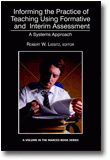
Informing the Practice of Teaching Using Formative and Interim Assessment
A Systems Approach
Edited by:
Robert W. Lissitz, University of Maryland
A volume in the series: The MARCES Book Series. Editor(s): Hong Jiao, University of Maryland. Robert W. Lissitz, University of Maryland.
Published 2013
This book focuses on interim and formative assessments as distinguished from the more usual interest in summative assessment. I was particularly interested in seeing what the experts have to say about a full system of assessment. This book has particular interest in what information a teacher, a school or even a state could collect that monitors the progress of a student as he or she learns. The authors were asked to think about assessing the effects of teaching and learning throughout the student’s participation in the curriculum.
This book is the product of a conference by the Maryland Assessment Research Center for Education Success (MARCES) with funding from the Maryland State Department of Education.
CONTENTS
An Introduction, Robert W. Lissitz. Connecting the Dots: Formative, Interim, and Summative Assessment, Dylan Wiliam, Gage Kingsbury, and Steven Wise. Design of Interim Assessment for Instructional Purpose: A Case Study Using Evidence Centered Design in Advanced Placement, Lori Nebelsick-Gullett, Cindy Hamen Farrar, Kristen Huff, and Sheryl Packman. Integrating Student Standardized and Formative Assessments With the National Board for Professional Teaching Standards’ Teacher Development Process, Joan Chikos Auchter. Using Assessment Information in Real Time: What Teachers Need to Know and Be Able To Do, Margaret Heritage. The Instructional Influence of Interim Assessments: Voices From the Field, Lisa M. Abrams and James H. McMillan. Sourcing Instructionally Embedded Formative Assessments, William D. Schafer. Marrying Periodic and Summative Assessments: I Do, Kimberly O’Malley, Emily Lai, Katie McClarty, and Denny Way Pearson. Comprehensive Assessment Systems in Service of Learning: Getting the Balance Right, Susan M. Brookhart. Errors in Student Learning and Assessment: The Learning Errors and Formative Feedback (LEAFF) Model, Jacqueline Leighton, Man-Wai Chu, and Paolina Seitz. Toward a Technical Theory for Systems for Learning: The Role of Information, Paul Nichols and Charles DePascale. Productive Formative Assessment ALWAYS Requires Local District Preparation, Rick Stiggins. About the Contributors.
-
Paperback9781623961114
Web price: $45.04 (Reg. 52.99)
-
Hardcover9781623961121
Web price: $80.74 (Reg. 94.99)
- eBook9781623961138

- EDU037000 - EDUCATION: Research
- EDU009000 - EDUCATION: Educational Psychology
- EDU030000 - EDUCATION: Testing & Measurement
-
 Application of Artificial Intelligence to Assessment
Application of Artificial Intelligence to Assessment
-
 Data Analytics and Psychometrics
Informing Assessment Practices
Data Analytics and Psychometrics
Informing Assessment Practices
-
 Enhancing Effective Instruction and Learning Using Assessment Data
Enhancing Effective Instruction and Learning Using Assessment Data
-
 Innovative Psychometric Modeling and Methods
Innovative Psychometric Modeling and Methods
-
 Machine Learning, Natural Language Processing, and Psychometrics
Machine Learning, Natural Language Processing, and Psychometrics
-
 Technology Enhanced Innovative Assessment
Development, Modeling, and Scoring From an Interdisciplinary Perspective
Technology Enhanced Innovative Assessment
Development, Modeling, and Scoring From an Interdisciplinary Perspective
-
 Test Fairness in the New Generation of Large‐Scale Assessment
Test Fairness in the New Generation of Large‐Scale Assessment

